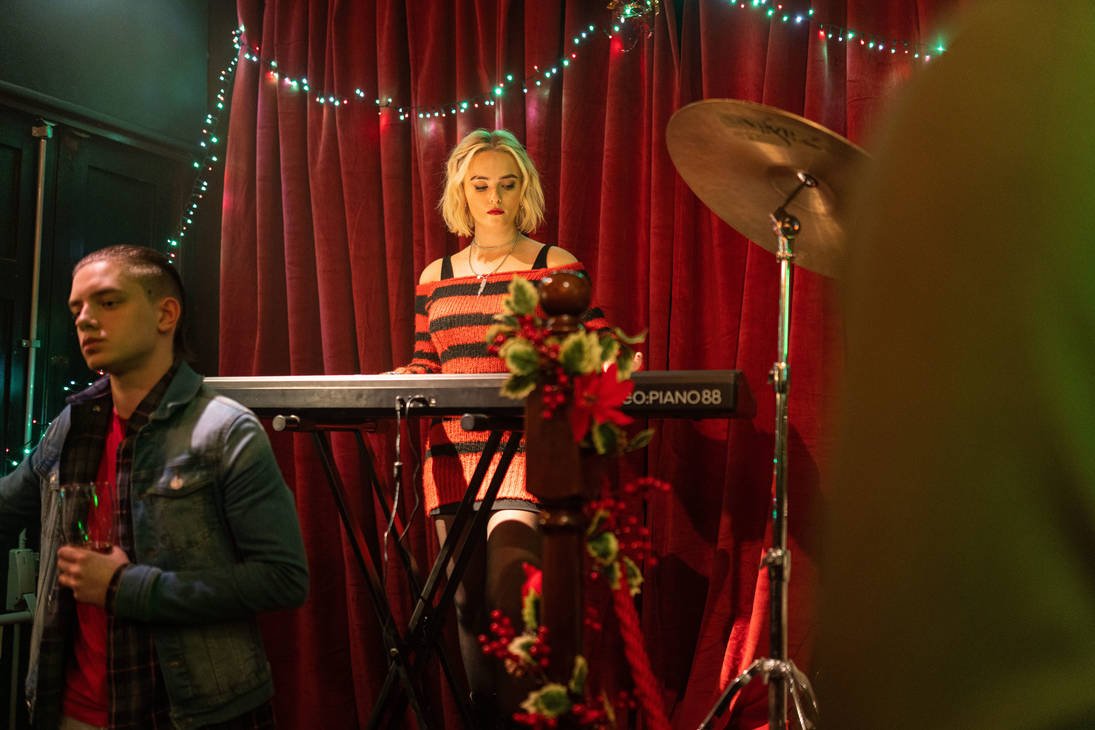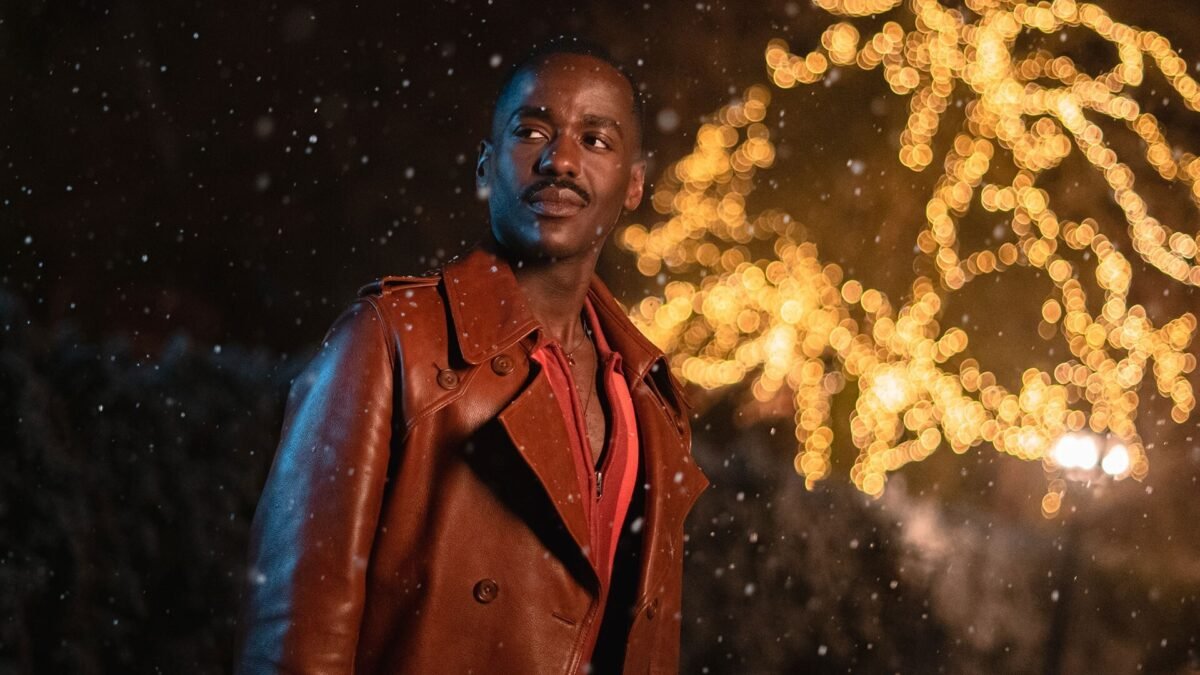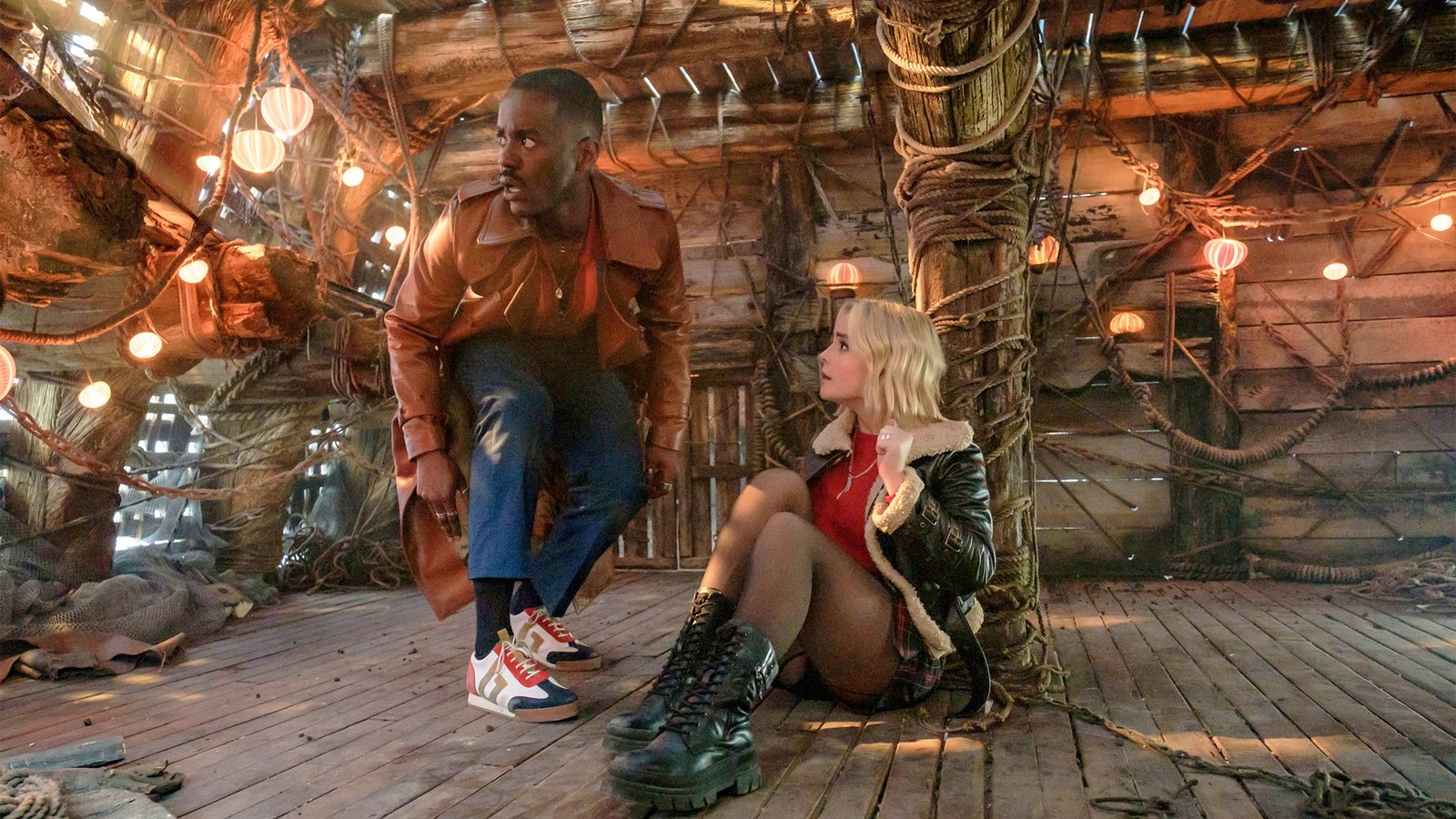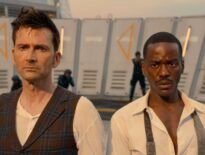There was a rather interesting section in The Church on Ruby Road, the first full episode with Ncuti Gatwa as the Fifteenth Doctor and introducing Millie Gibson as Ruby Sunday. No, I don’t mean the singing; nor the time-rewriting stuff, or even the mystery around Ruby herself. I’m talking about the Doctor pondering new languages. It was somewhat tongue-in-cheek nonsense about learning the language of “rope”, but in amongst it, we experienced a new way of approaching Doctor Who. It’s a rather convoluted and difficult thing to get a grasp on, full of contradictions and things that make you squirm, but that’s language for you. You won’t find either Doctor Who or rope on Duolingo, so for now, we’ve just got to go with it, see how this language progresses, and hope we can catch up before our new-found knowledge-base becomes anachronistic.
Because for years now, we’ve been told that “Doctor Who is about change”, but it’s not really, is it? For much of its history, the franchise has adapted, yes, but essentially stayed true to its origins. There’s a clear line to be drawn between now and then; yet, like The Beatles’ last track, we find that, with all the changes and with the absence of change, nonetheless we miss you, Doctor Who. What “Doctor Who is about change” likely means is that we change, so our relationship with the series changes as well – so too our views on stories, on themes, on that central character and the overall narrative. Still, I find myself in a difficult position, admitting that that point of view was then; this is now, and our favourite sci-fi show isn’t the same as it once was. Sometimes, you drift so gradually that you don’t think to look up before it’s much too late and you’re a long way from the shore; other times, you’re caught in this riptide and the land has vanished in an instant. And in some very rare cases, both things happen, as is the case with Doctor Who.
What makes this period of the franchise so stark is that things feel so different despite there being a renewed hope a couple of years ago that returning showrunner, Russell T Davies, would bring things full circle (full circle, that is, for 21st Century Who). But Davies is rightly a different person now. Compare how you are now to how you were in 2005. This is only natural. So why and how does The Church on Ruby Road feel like both more of the same and something new? Why does it sit so awkwardly?

Davies does a lot of things that he’s done before: perhaps most subtle (though I use that word very loosely when approaching anything by the writer) is how new companion, Ruby, is part of a band with a trans person, a retread of Russell’s Rose novelisation, which saw Mickey Smith in a band called Bad Wolf, led by a trans woman, Sally Salter. Less subtle is Ruby herself, who appears at first glance to be a generic companion – meaning a confident, sometimes sad, young, caring, pretty go-getter – for the Doctor and the audience to fixate on. Having never seen Gibson in anything before, I was certainly intrigued to see how she’d get on, and I was let down slightly by her tumultuous first scene in which she and Davina McCall have a curiously hectic TV interview. But she soon charmed me. The loud Northern façade hides a deeper performance and a lovely connection with our new Doctor.
There’s a warmth to her that draws you in, although it’s interesting that she never really feels at home in her actual home. There’s a clear love there between her, Carla (Michelle Greenidge), and Cherry (Angela Wynter), but her home doesn’t feel very… homely. There aren’t many trappings of everyday life there. That could be because Ruby is sadly the only one of Carla’s foster children to stay there, to make it her home, so it feels a little like a transitional space. That coldness is only added to because Carla doesn’t act the way she should: in writing that’s shockingly uncharacteristic of Russell, she doesn’t react as a normal person would when the Doctor, a complete stranger, wanders into her home after Ruby is erased. She’s just… okay with it. Accepting. Despite the door being locked. (And the less said about the new sonic “screwdriver” the better.) That really jars.
Ruby’s absence does hit hard though. The audience’s realisation that she’s gone surely comes much earlier than the Doctor’s; similarly, we presume that the photos on the fridge will have also vanished before the Doctor makes this revelation (if only because it was set up nicely, and Davies is much too good a writer to forget that key law of screenwriting: show, don’t tell).
The Goblins are a strange creation too. They straddle the line between what Doctor Who does and what it doesn’t do. Russell mentioned before that he’s incorporating elements of fantasy (as a genre) into Doctor Who, and that makes me nervous – I simply don’t connect with fantasy, and it troubles me that Doctor Who is straying farther away from the shore on which I’d contentedly found it. But the Goblins are just aliens. Swap them with Bok or the Zocci and there’d be very little difference. Oh sure, they sing, but so does the Doctor. Oh sure, they eat babies, but so do the giants in The BFG. They can, however, travel in time (no matter what the Doctor says), and that sets them apart, makes them a bigger threat than they initially seem. Actually, they should be a bigger threat than they are, considering they just dissolve away once their King experiences the Timothy-Dalton-in-Hot–Fuzz treatment. As with most aliens in episodes that introduce companions, they’re a gateway to our new dynamic.

Davies would’ve been safer going with an established threat, either a recognised foe or something that fits the standard alien invader outline, but you’ve got to admire his need to do things differently, even if not every note hits the right tone. Or indeed, even if a few knots can bring down the plot. This wasn’t the strongest of narratives, but it swept along at a cracking pace with enough character beats for you to invest in these additions to the Doctor Who mythos. One of the most startling things about Russell is that he exudes enthusiasm from every pore, so it’s just as surprising that The Church on Ruby Road doesn’t fizz with refreshing notions. It’s not exactly Doctor Who as we expect it to be, but it’s perhaps Davies as we expect him to be right now. It’s interesting that someone so alive with notions is still very much set in a particular mindset. That’s ironic, too, given the diatribe fed to us in The Giggle about the dangers of always thinking you’re right. That isn’t a criticism of Davies: he’s one of the show’s best ambassadors, and he will always have my utmost respect. I just find it interesting, in this strangely intangible way. That is likely the word I attach to the mixed bag that is The Church on Ruby Road most of all, and so far to Davies’ return to Doctor Who: interesting.
And what of the elephant in the room? What of Ncuti Gatwa? Our Fifteenth Doctor? He’s excellent. There’s something fascinating about him, from his confidence and fragility (is he the first Doctor to cry in his first full episode?) to even his accent and grin. You can see there’s so much more going on behind those eyes. I didn’t always buy it, sadly: the thing that stuck out like a sore thumb was his dancing in that nightclub. Why? Lots of Doctors have danced. The nightclub itself felt a strange move, but the thing that jarred most is that he looked… too cool? The Doctor is awkward! He’s not human! There’s a marked difference between the drunk giraffe the Eleventh Doctor showed off on a couple of occasions and the whirling storm the Fifteenth Doctor immediately is. The former is a storm that has the capacity to be a drunk giraffe; the latter hasn’t demonstrated anything but his sure-footedness. I hope that’s still to come because I like my Time Lord to be something other. And Gatwa is very capable of it.
Despite that bump in the road (and the awful bigeneration guff), he’s the Doctor, and that in itself is an achievement so early on. Because when things went wrong, when the Goblins took Lulubelle, when Ruby disappeared, we knew things were going to be alright because the Doctor is here to fix them. Bizarrely, I didn’t even feel that way with David Tennant’s Fourteenth Doctor, who was so consistently on the back foot.
The Church on Ruby Road isn’t my ideal Doctor Who: its semantics, phonology, and referents are all askew; I’m scrabbling around, looking for its foundations; and who the heck put that accent grave there?! But after watching it, I did feel this little frisson of energy, something that I’ve not truly felt since 2017. Doctor Who is back. Oooh, Doctor Who is back.
I might not be very good at it, but it’s okay – I like learning new languages.



